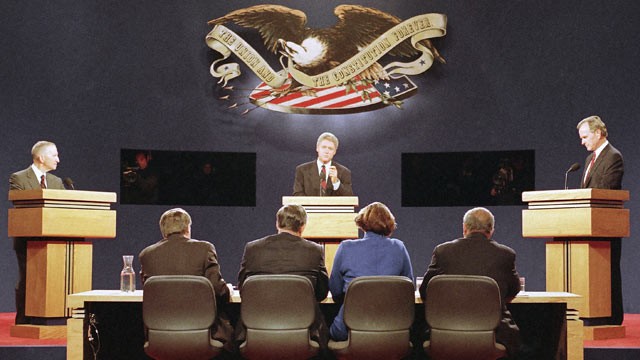When the final presidential debate wrapped up on Monday night, early reactions were dominated by surprise; that in a debate intended to focus on foreign policy, both candidates had been quick to veer into economic issues in spite of the topic at hand.
One of the debate's big moments, in fact, wasn't related to foreign policy at all, but involved President Obama making the bold claim that at the end of 2012, despite current law, sequestration "will not happen". Also, of course, was the other big moment, wherein Obama related Mitt Romney's worries about the size of the military to our lack of "horses and bayonets".
I'd actually like to tie these two topics together a bit for you, but first, a little more back story.
In the final hours of last summer's debt ceiling crisis (which contributed in no small part to the start of this blog), Congress
The bill created the so-called supercommittee, a bipartisan group of legislators charged with finding a billion dollars or so worth of spending cuts to offset the debt ceiling increase. When they failed miserably a few months later, that turned the necessary cuts over to a process called sequestration, which would automatically take huge chunks out of future spending across the board, both defense-related and domestic, at the end of 2012.
While the sequestration cuts are viewed fairly universally as quasi-disastrous, and capable of sending the US into another recession, Obama's original reaction to the failure of the supercommittee was to promise that he would veto any attempt to wriggle out of them; either Congress find new cuts themselves, or they have to live with the consequences.
Cut to a year later, and he's suddenly got faith in Congress' ability to get things done? Well, maybe, maybe not. I don't think Obama expects the election to hinge on the threat of sequestration (or any quadrisyllabic word, for that matter), and whether he wins the election or not, by the time the year ends and the cuts theoretically take place, there'll be nothing the voters can do to him about it. This is Congress' mess either way, so better to play the optimist on the eve of your reelection than the doomsayer.
But let's circle back around to Obama's other debate comment, the one about bayonets. The point he was making was that America's military superiority should be dependent upon demands and capabilities, not sheer size. We're used to operating on the same playing field as our enemies, but that hasn't been the case since the Cold War ended. Lacking bayonets doesn't make us weaker because bayonets are irrelevant to the modern world (I might argue that the same applies to aircraft carriers and submarines, but I digress).
What I will argue, though, is that this philosophy applies, or should be made to apply, to all federal spending. I would wager that a great deal of federal programs are as useless to today's economic landscape as bayonets are to today's battlefield, and while the very foundation of this blog is that federal spending is generally fine and dandy, if we're truly so committed to making serious cuts, well, that's a conversation we can have. And if the result is that jobs are lost and our economy shrinks, the Tea Party can add that to its résumé for the midterms.
But personally, I don't see sequestration as losing a limb; I see it as rightsizing.
Further Reading
A Glossary of Political Economy Terms - Sequestration
Sequestration Cuts Will Be Avoided By Congress As Obama Claimed, Senator Mark Warner Says
Wikipedia - Budget Control Act of 2011
Is America's navy shrinking too much?


